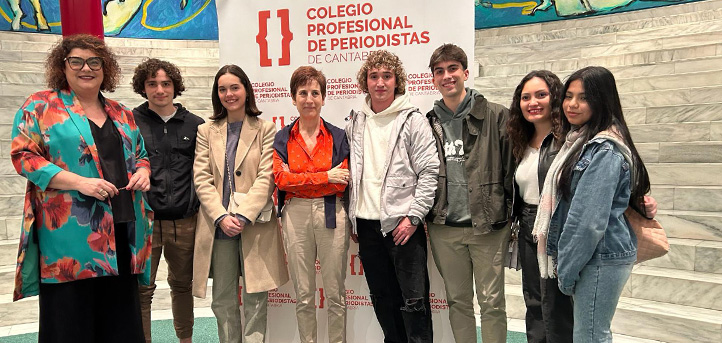Ángeles Espinosa, former El País correspondent, an analyst on Arab and Islamic world affairs, opened the Foro de Periodismo Matilde Zapata (Matilde Zapata Journalism Forum) of the Colegio de Periodistas de Cantabria (Cantabria College of Journalists) by explaining the geopolitical keys of the countries of the Middle East. The talk by Espinosa, who has three decades of experience as a correspondent in Dubai, Tehran, Baghdad, Cairo, and Beirut, took place in the Sala María Blanchard (María Blanchard Hall) of the Palacio de Festivales de Cantabria (Festival Palace of Cantabria).
The journalist shared with the audience reflections and experiences of key events in the area that she has covered for El País, such as the Iran-Iraq war, the two US wars against Saddam Hussein, the conflicts in Lebanon, Palestine, and Yemen, the US bombing of Afghanistan, and the Arab Spring.
In this first meeting, led by the dean of the Colegio de Periodistas de Cantabria and professor at the Universidad Europea del Atlántico (European University of the Atlantic, UNEATLANTICO), Olga Agüero, the veteran journalist has delved into the fracture of Gaza, the role being played by the surrounding countries, and especially Saudi Arabia, as well as the ongoing conflict in Beirut.
Espinosa recalled her expulsion from Tehran in 2010 when the Iranian authorities cancelled her residence permit and gave her two weeks to leave the country. However, her moment of greatest uncertainty and fear came when she was held by the Taliban in Afghanistan, although she was eventually released. In this sense, she referred to the idealization of the war correspondent, and the fact that it is much more difficult to be a local journalist, without the coverage of a foreign country’s media and government.
In the talk, Espinosa analyzed the role of the United States in countries in the region and was cautious when judging them since she considers that they are criticized when they intervene and at the same time when they do not. The situation of women in Iran was another of the topics she dealt with from the analytical perspective of the social transformations in these Middle Eastern countries, which she has developed in some of the four books she has written as a result of her journalistic experience in this area.
The Foro de Periodismo Matilde Zapata is an informative space open to citizens to analyze the profession and current news through the eyes of experts and professionals in journalism and communication. It was created with the aspiration of disseminating the role and work of journalists through conversations and meetings with media professionals and, at the same time, to contribute to inform citizens about current affairs through analysis and debate. This forum will also serve to analyze the role of the media and the evolution of journalism itself.
Through the possibility of going off-campus for informative talks, UNEATLANTICO encourages students to learn more about the profession and with it the professionals of the profession, showing them the reality with their own experiences.


